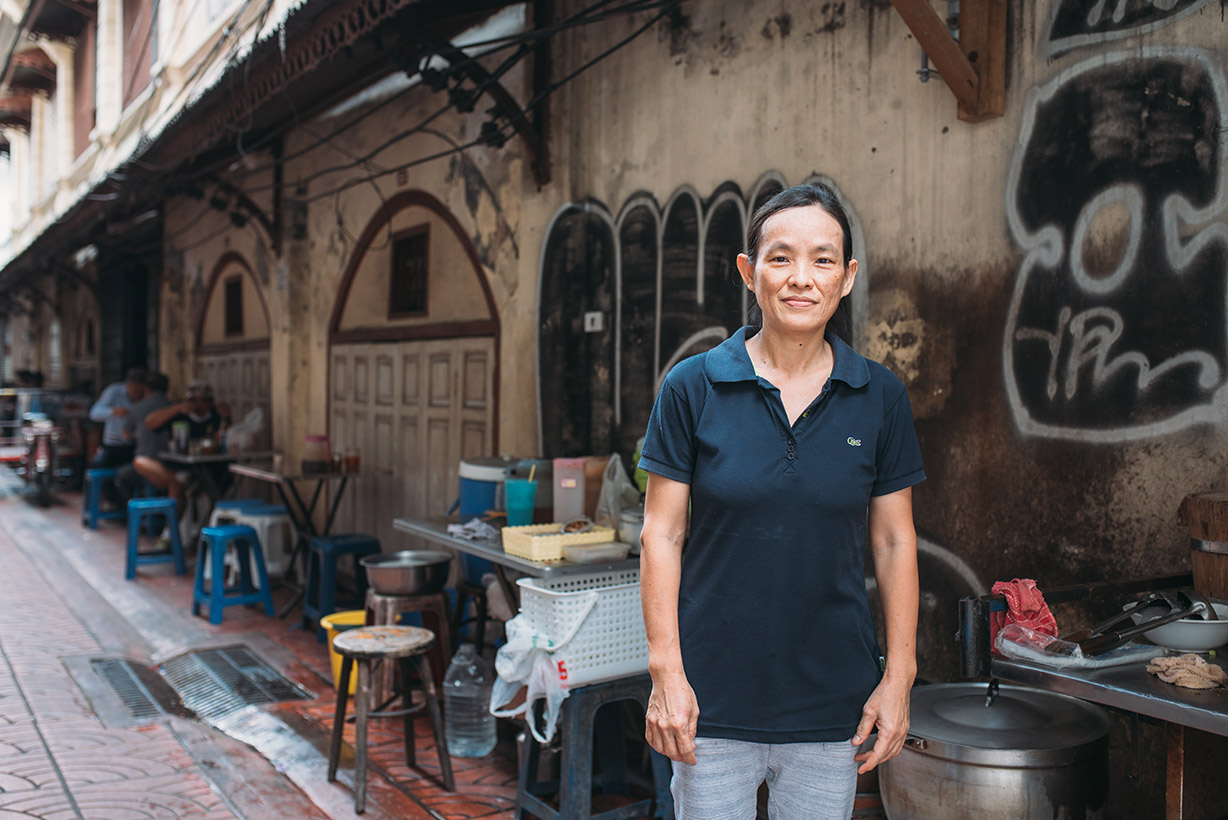INTRODUCTION
Sirirat also goes by the nickname Lek. Her parents came from China, escaping World War II by ship. Her mom, a Teochew woman and excellent cook, crafted the authentic Rolled Chinese Crispy Pork Noodle recipe beloved by thousands of customers at Guay Jub Song Wat over the past 50 years. As with so many other shops around Chinatown, she is a last generation owner. Cooking authentic Guay Jub is hard work, especially cleaning the pork entrails, which is an hours-long daily process. Urbanization means others who traditionally would have inherited the family business have turned to different economic opportunities. Sourcing quality ingredients is another challenge. P’Lek’s hard work and dedication means to this day loyal customers can continue to enjoy the shop’s beloved authentic taste. But the shop’s future is less certain.
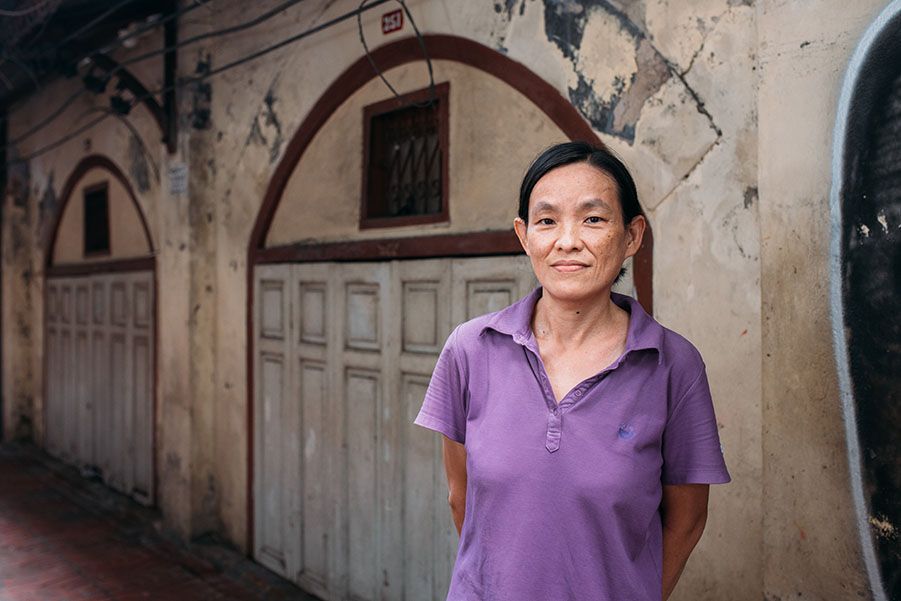
Second generation and a flavorful institution on Song Wat Road, one of Bangkok’s first major commercial roads.
The origins of one of the best Chinese food vendors
My mom began as a seamstress sewing clothes at home and making Guay Jub (Chinese flat and rolled rice noodles) for my dad to sell at Song Wat Road more than 50 years ago. My mother is very creative and has a lot of ideas about cooking; when we eat food in a restaurant, she can taste and instantly knows all of the ingredients in the food and knows how to cook it. I took over as the third owner after my mom and then my eldest sister passed away. The income is more than I could make working in a company. It supports all the members in our household.
Some of the best crispy pork in town.
Back then we were four people selling Guay Jub, now it’s only me with my nephew. The highlight of our shop is crispy pork. It’s crispier than elsewhere; a lot of customers love it and they also like to take pictures of my stove, because I still use a charcoal oven — something only few people do these days.
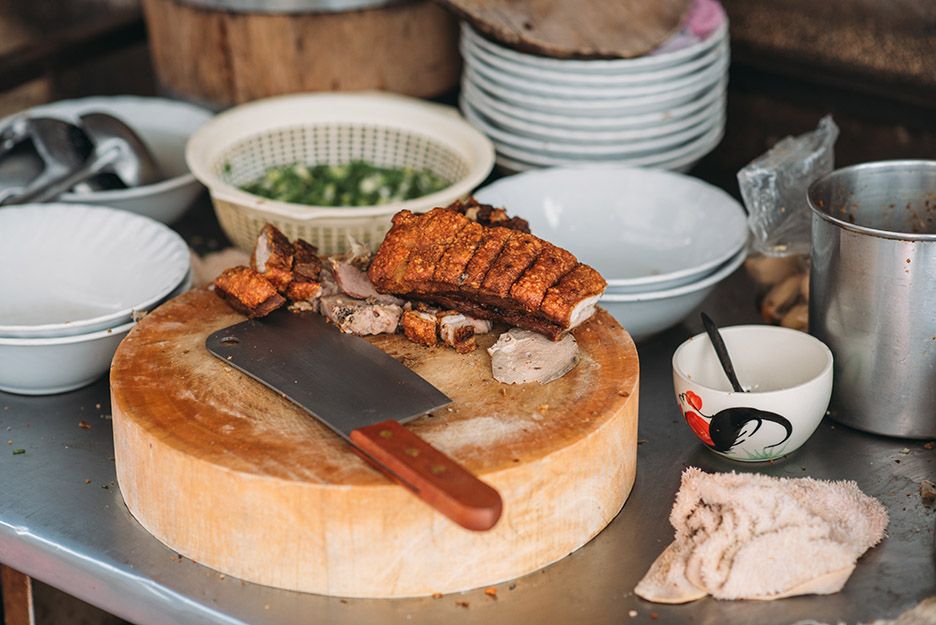
Insanely crispy on the outside with great saltiness and soft and juicy on the inside.
They also take snapshots of the wooden bucket that contains Guay Jub. I adopted this recipe from my mom but I am not sure if our Guay Jub recipe came directly from China.
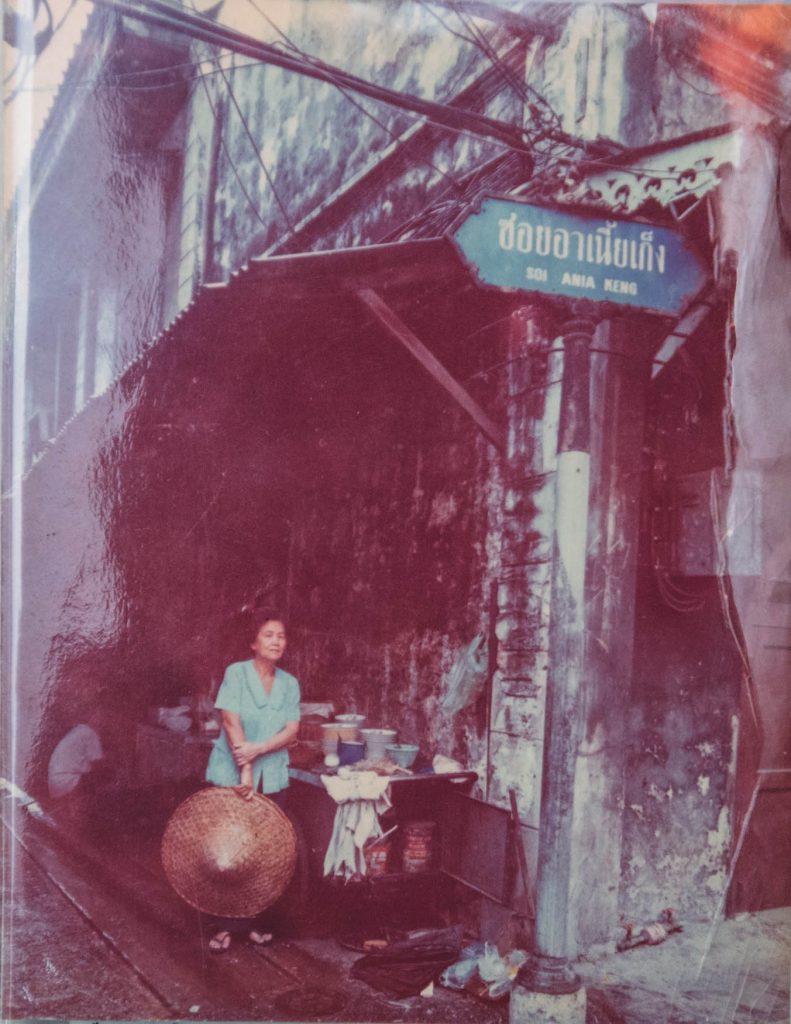
The humble beginnings. Sirirat’s mother back in the day.
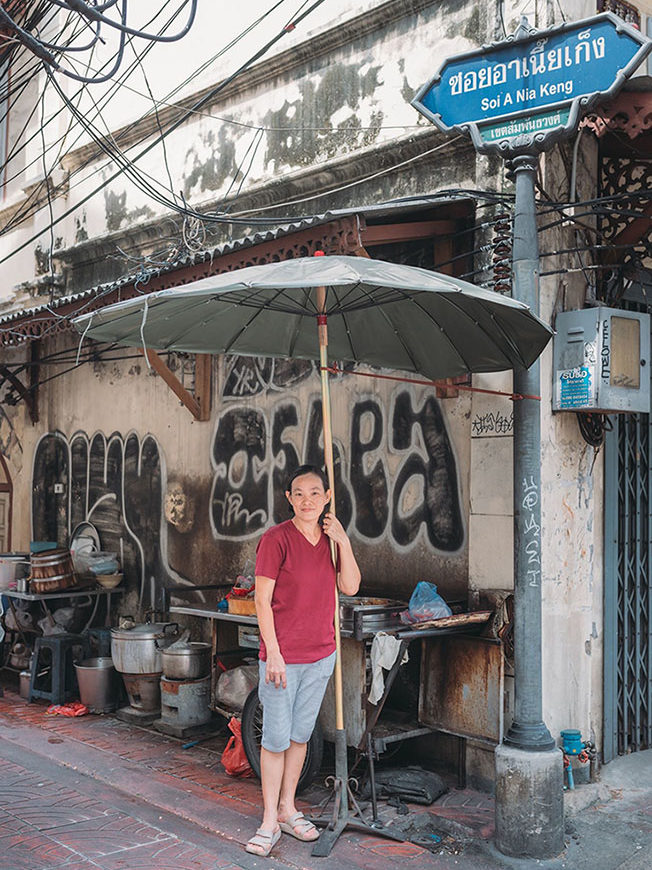
Her daughter Sirirat at the same spot sixty years later.
The long process – Good quality doesn’t come easy
Making Guay Jub is hard work. When we close the shop, we go to the market to buy all the ingredients. I buy the raw pork from Wongwian Yai market and spices and vegetable from Pak Khlong Talad but then the actual work begins.
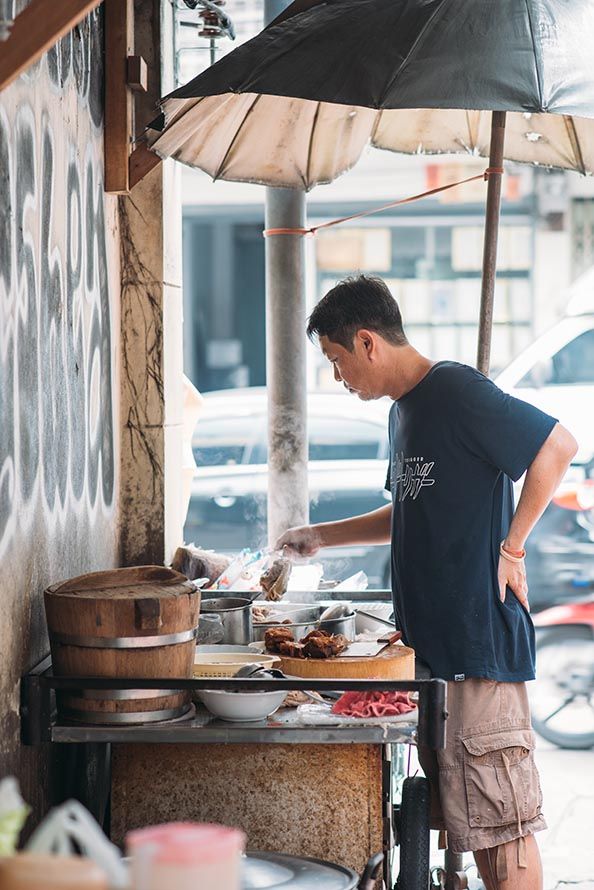
Sirirat’s nephew managing the stall with her.
MARINATE. Back home, I wash and boil the pork belly in a soup then stab it to let the water out. I marinate the pork with salt and refrigerate it overnight.
CLEAN. Then begins the long process of cleaning the raw pork organs and entrails for the next day. That is the hardest part. It includes the stomach, tongue, heart, intestines, liver and lungs and you have to clean the organs and get rid of all the dirt especially the intestines.
SALT. I have to clean it myself because the shops leave the fat in the entrails so it increases the weight so they make more money. To make sure it is completely clean, I clean them many times over. I have to boil and crumple it with salt and repeat this process about three times until the fat and the smell is completely gone. After the cleaning I will refrigerate it till the next day. The next day I wake up around 4:30a.m. and fry the boiled pork belly for 2 hours so it keeps its crispiness throughout the day and prepare the organs with spices.
LAST GENERATION. The whole process is really tiresome and nobody wants to do this type of work anymore but the old generation Chinese love Guay Jub with entrails while the younger generation prefers it only with crispy pork and egg. They told me, please don’t stop selling, there’s nowhere else nearby we can find this but I’m the last generation, there is no one after me.
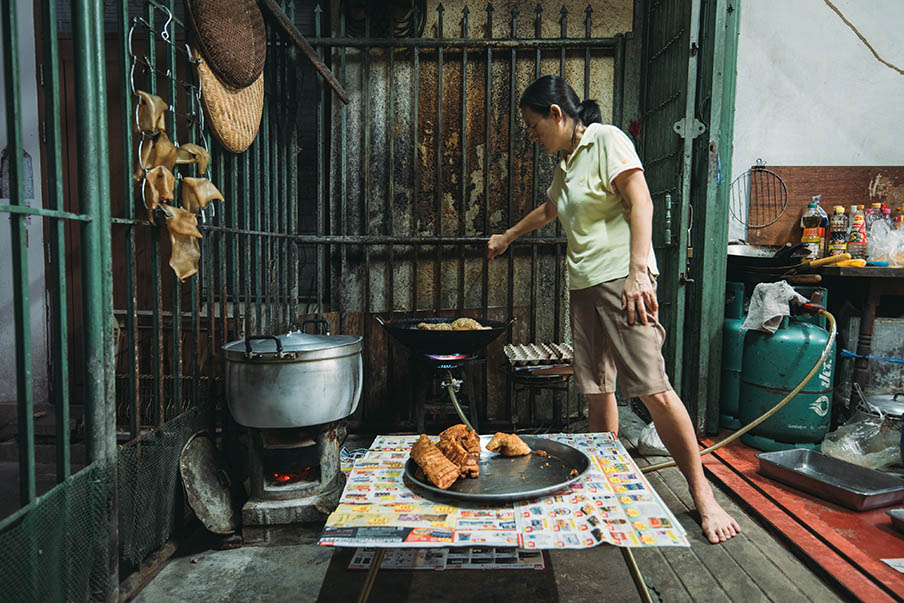
Sririat at her home. Long hours of meticulous preparation to keep the standards that previous generations have set.
Original Chinese flavors
I make sure our Guay Jub keeps its original flavor, just like it was sold in the old days. There aren’t many shops anymore where you can experience the original flavors because most Guay Jub vendors in Chinatown are not Chinese anymore.
If you change the cook, you change the taste.
TWO KINDS. There are two kinds of Guay Jub, thick soup (Pa Lo style) and clear soup like ours, we don’t use soy sauce, only with salt. My Guay Jub is quite intense as I add a lot of spices, including pepper, garlic and coriander root. My own spice ratio creates the intensity.
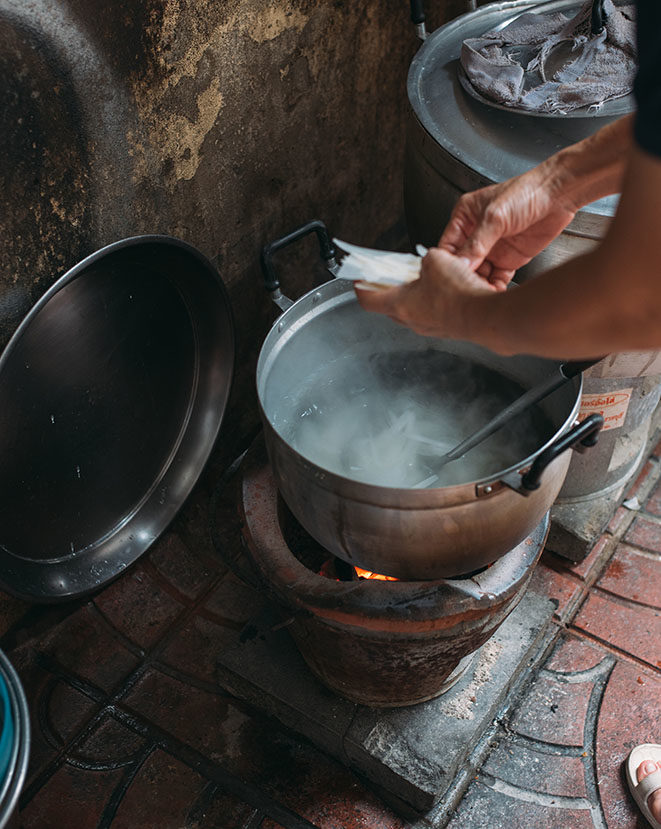
Bangkok’s best Chinese rolled rice noodles.
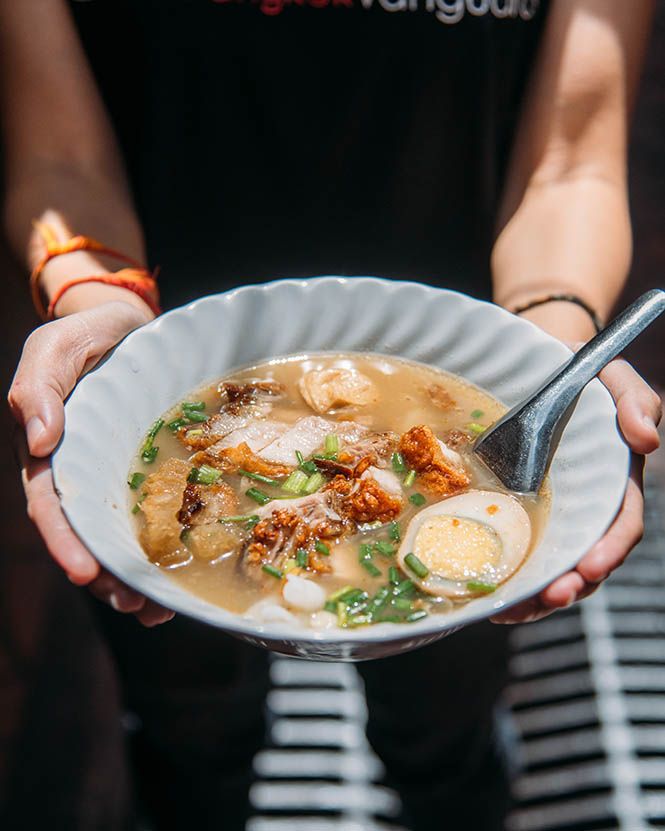
16 hours of work per day goes into purchasing, preparing, setting up, cooking and serving.
If you change the cook, you change the taste.
Song Wat Road used to be a very busy market for trading spices, seeds and other goods. There were always traffic jams and lots of people would come to eat at our shop. I have known my customers for so long. They are like relatives.
There was one nice lady from Talad Noi who often came to eat here and every time she ate here she would invite all the guests. Now she is old and can only order by phone and asks me to send it to her home.
Many customers passed away over the years many businesses as well as government offices moved to other places. The government’s ban on street vendors is another factor that makes this area more quiet because people used to come here for street food. It’s good to make the pavement more orderly, but they shouldn’t chase street food vendors out.
Some customers are like relatives. The social bonds of street food that are important to the city’s neighborhoods.
Since the end of last year they have banned street food from both sides of the road. My shop is located in the alley; we are safe for now. All these factors had an impact on my business; my income has decreased by 50% during the past 2-3 years.
Typically we sell about 100 bowls a day at 60 baht each (total 5 kg of pork). Before, I used to use 10 kg of pork. But now in the shop we have only two people, so we sell only what we can handle.
Tourism in Chinatown
When tourists walk through the area, many will stop as they are drawn in by the fragrant aroma. Few dare to try it because of the pork entrails but actually Guay Jub can also be ordered without innards and only with crispy pork but they don’t know. Even when the Thai tour guides explain our dish to the tourists, many still do not eat it!
Check out our project. Lets not have hungry travellers take a picture and walk away anymore
Many travelers visit Sampeng but Song Wat is the area where you can see a lot of ancient architecture. The Crown Property Bureau owns the area and rents out to most of trading companies and warehouses. They want to preserve the ancient architecture and that’s why we see music videos made here and people taking photos of the alleys, including the alley where I sell Guay Jub.
Ideally, I want Sampeng and Song Wat to be a tourist attraction. I think it’s very well suited because there are a lot of tourists and through their visits they help to preserve our cultural heritage and the memories of delicious recipes like Guay Jub Song Wat.
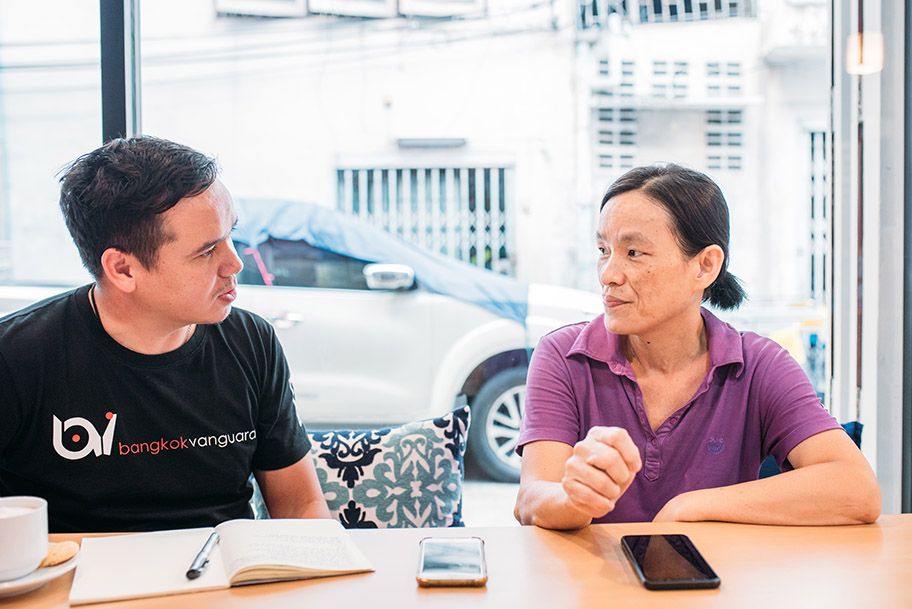
Sitting down and learning from Pee Lek
Vendors such as Pee Lek are crucial to the functioning and attractiveness of old town neighborhoods. She sees tourism as potential but travelers are not inclined to buy from her business even though the quality of her products surpasses that of the same dishes you’d find in luxury malls that are being promoted by the government.
My favorite being Guay Jub with only crispy pork and egg. Check out our new menus on site (In English, German and Chinese). Story in the YouTube Video above.
If you’re visiting Chinatown via Chao Phraya Express Boat and get off at Ratchawong Pier (Pier 5) and you’re hungry, buy a bowl of Guay Jub (Mon-Fri 9:00a.m. – 2:00p.m.)


